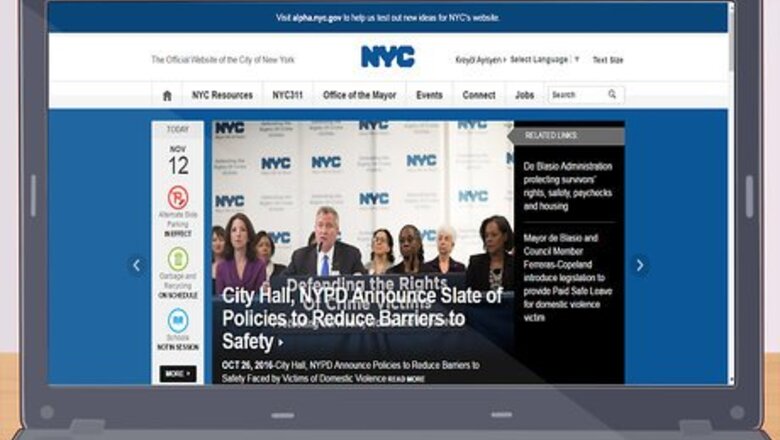
views
Solidifying Your Decision to Move
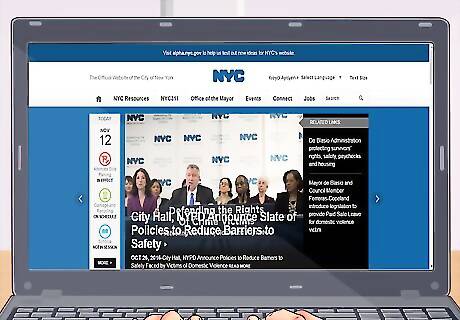
Research the city. NYC is a large, culturally diverse, and dynamic city, and there's a lot to learn about it before moving there. Take the time to scour books, articles, and websites for reliable information about the city. This exercise will also help you boost your excitement about the move. Start by looking at: the official website of the City of New York: https://www1.nyc.gov reputable travel guides like NYC Go or Fodor's NYC newspapers
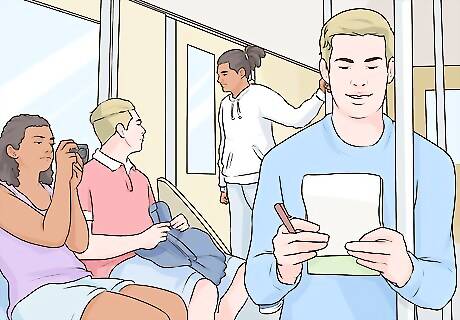
Visit the city and explore. Before making a final decision, visit NYC and go beyond the tourist experience; take public transit, and visit small shops, pharmacies, grocery stores, and local restaurants. Bring a notebook with you to take detailed notes about the places you liked the most, things you want to avoid, and details that you want to remember. Make sure to visit all five boroughs of the city: The Bronx: known as the home of the New York Yankees and the birthplace of the hip hop genre; it is also where you'll find the Bronx Zoo and the New York Botanical Garden Brooklyn: home of tourist favorites like the Brooklyn Bridge, Prospect Park, and Park Slope Manhattan: location of some of NYC's most famous attractions, including Times Square, the Empire State building, Central Park, and Broadway Queens: home of the New York Mets and the Queens Botanical Garden Staten Island: known for the famous Staten Island Ferry, Historic Richmond Town, and NYC's largest forest preserve

Get advice from New Yorkers. If possible, have a conversation with a resident New Yorker about all of the best and worst aspects of living in NYC. If you do not have any friends or acquaintances in the city, visit online communities or message boards to ask questions and seek advice before your move. If someone you know has moved to NYC recently, ask them for any information or resources they can provide. For example, you could ask: "Can you tell me about the transit system in your area?" or "What do you wish you had known before moving here?"

Save up. The basics of life are more expensive in New York, for the most part, so you should make sure to have extra money in the bank before moving there. Between paying any costs associated with leaving your current residence, hiring movers, paying a security deposit on a new place to live, and getting set up with new utilities there, the move itself will be quite costly as well. To truly be prepared, you should start saving as far as a year in advance of your move. You should compare your current and expected costs of living and determine whether this is a relocation you can afford at this time.
Testing Out the Job Market in NYC

Send out your CV. Ensuring that you will have a job in your new city is of the utmost importance. Get the ball rolling on finding employment by preemptively sending out your CV to New York employers. Even if you don't find a job before your move, it is wise to get to work on the job search before the stress of moving can distract you. To increase your chances of getting a job this way, try leaving your current address off your applications, or use a local New York address. Look for opportunities in areas that interest you. New York is famous for being a hub for finance, banking, and communication, but if your interests are not aligned with that, it's still a place ripe with opportunity.

Note that you will cover travel expenses. Communicate in your cover letter that you will pay for your own travel expenses for potential job interviews or a move to NYC. This will demonstrate your enthusiasm and present you as less of a financial liability. Be clear and optimistic in how you word this. For example, you could say: "I am more than willing to cover the expenses incurred to pursue an opportunity to work at your company."

Use networking sites to connect to potential employers. To connect to possible employers in the city, join a career networking site like LinkedIn to make contacts virtually. Put effort into building a profile that sells you as a qualified job candidate to employers and job recruiters. Be sure to connect with NYC-based companies that seem interesting to you.
Finding an Apartment
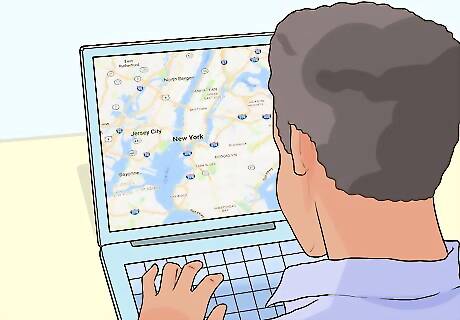
Choose the area you want to live in. NYC has hundreds of distinct neighborhoods to choose from, situated in its five boroughs. These communities are unique and feel like small cities of their own. Research, explore, and follow your gut feeling to choose the right area for you. Some popular neighborhoods in NYC are: Greenwich Village: one of the most expensive neighborhoods in New York; home to NYU and Washington Square Park SoHo: a gentrified lower-Manhattan neighborhood full of art galleries and upscale shops Financial District: home of Wall Street, One World Trade Center, Federal Hall, Battery Park City and the 9/11 Memorial Meat Packing District:home of the Chelsea Market and Whitney Museum of American Art, and a prime neighborfood for fine dining and nightlife Tribeca: known for the Tribeca Film Festival
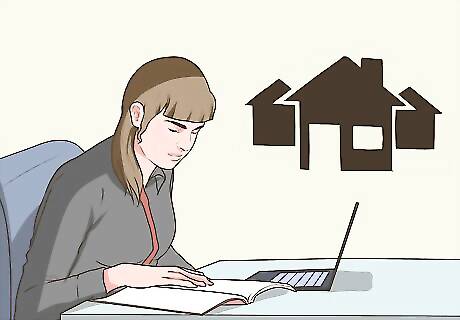
Search for apartments. Scour Craigslist and "for rent" ads, or hit the pavement to find a new apartment in an area that you like. Be prepared to spend a bit more on an apartment than you budgeted for; many NYC renters require you to make 40-50 times the monthly rent and require a guarantor's signature if you don't. Broker fees also apply, more often than not, and are usually 15% of the yearly rent. Don't hesitate too long before signing a lease on an apartment that you like; they go very fast. It can also help to join a local Facebook group and ask questions about the area (like how much the rent usually goes for).
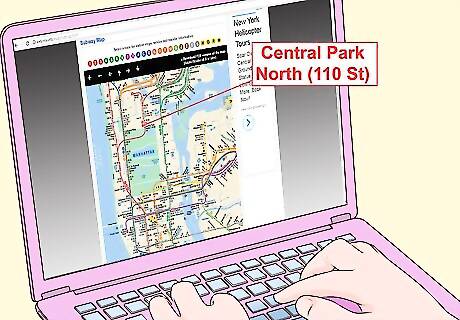
Consider your commute. Transportation is a big issue in NYC, so consider your daily and weekend transit needs before choosing an apartment. Check if there are buses that stop nearby, how far away subway stations are, and how easy it is to get a taxi. Aim to be close to a subway, particularly if you find a job far that is from your desired neighborhood. You can search the subway map on the MTA website: https://web.mta.info/maps/submap.html Keep in mind that even transit-friendly areas are subject to major delays on weekends.

Prioritize safety. Before you choose an apartment, look into the safety of the neighborhood. Ask potential neighbors about the area or look up crime statistics online. You should also visit the neighborhood at night to see if the atmosphere is a lot more different after dark than it is during the day.
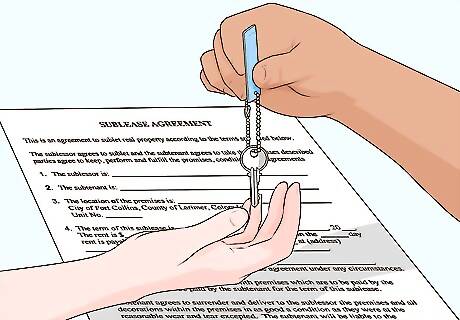
Think about a sublet. To make sure that you're comfortable in the neighborhood, consider subletting an apartment for a few months rather than signing a year lease right away. Subletting will also allow you to avoid paying broker fees and skip the credit check portion of the apartment search. Finding a sublet is fairly simple by way of Craigslist and other online listing websites. Searching through social media in general or asking friends who live in the area are other ways of finding a sublet.
Facilitating Your Move
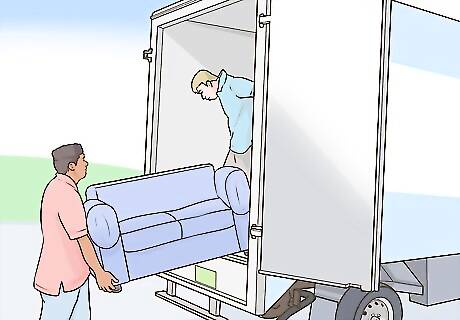
Prep, pack, and book movers. To avoid last minute stress, work out all of the details of your move weeks in advance and pack as early as possible. Get quotes from at least three different moving companies, look into their credentials, and book one right away; work out your own travel for the move to NYC early as well to ensure that you arrive at the same time as your belongings. If you are renting a truck instead, book just as early and find friends or family to take the trip with you to help.
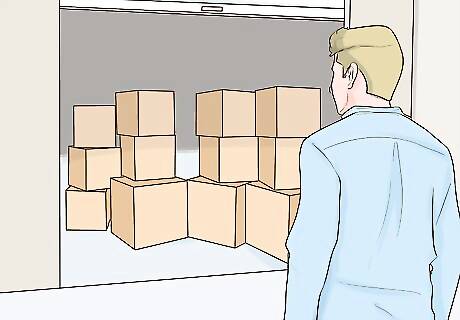
Think about storage. If you are moving to NYC before you have an apartment lined up, rent storage space to hold your belongings once you arrive. This is also an increasingly popular option for inhabitants of the city who simply want less clutter and more space. Make sure to work out the rental in advance, as the demand for storage is currently greater than the supply.

Arrange your accommodations. If you will be arriving in NYC before you have an apartment to stay in, arrange for a place to stay in the interim. Look well in advance to find accommodations, and do some extra research to find cost-effective options. Instead of hotels, consider short-term room rentals through sites like Airbnb, hostels, academic housing, and couch surfing.



















Comments
0 comment